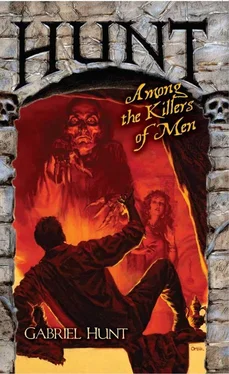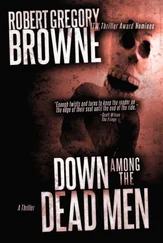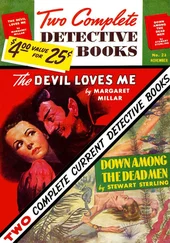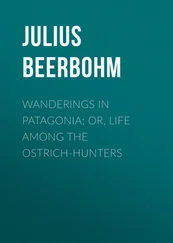Sure this was some kind of trick, Qi said, “Your apartment is in the city.”
“My apartment is not my home,” said Ivory. “It is necessary for appearances. No one knows of this place.”
“Not even Cheung?”
Ivory pursed his lips slightly. He closed the big iron door, then showed Qi he was standing down with the gun. He would not wield a weapon in here, and he was trusting her to listen to whatever he had to say. This was implicit when he stated, “I could have let Cheung have you back at the funeral.”
Then, maddeningly, he began to make tea as though it was the most natural thing in the world, even turning his back on her once or twice.
“Have you ever suffered a crisis of faith?” he said.
“Not religious,” Qi said, slowly taking a seat in an armless, hardback “drawer chair.”
“That’s exactly what Michelle Quantrill told me when I asked her the same question. You two have much in common.”
“I never saw her before the Zongchang casino,” said Qi.
“Nevertheless.”
“Why am I here?” Qi asked. “Why didn’t you do your duty and kill me when you had the chance?”
“Because I am finding out that some things transcend duty,” said Ivory. “Or at least some duties transcend others.” He waved this rather significant confession away. “Your holy war is to kill Cheung. Yet despite multiple opportunities, you have not. My conclusion is that you are more interested in discrediting me through attrition. To avenge your status as a Nameless One.”
“Perhaps I’m just a lousy shot,” she said. They both knew it was not true.
“You were dealt with unfairly. Michelle Quantrill’s sister was dealt with unfairly. It is the way of things in Cheung’s vision of the world. But while I might be your adversary, I am not your enemy.”
“That sounds terrific,” said Qi. “But what does it mean?”
“You have heard the parable of the warrior of great honor,” said Ivory, serving them both tea in small hammered cups that were both exquisite and comfortably weighty. “He was obligated to a cruel and uncouth master. He discovered such honor as his can be a trap, a snare that tightens the more you struggle against it. The more he tried to serve his master honorably, the more obligated he became, and the more implicated in cruelty himself.”
“You have already betrayed Cheung by sparing me. He will not forgive this.”
“He might not,” acknowledged Ivory. “But I need to see you and this other woman clear of Shanghai. Then my obligations will be ended, and Cheung can take such measures as he will.”
“You are wrong,” said Qi, “that we two are the only ones you have wronged. You have involved this man Gabriel Hunt as well. The stain of your crisis of honor is spreading like a disease.”
“You are correct. If I kill you now, my obligation to Cheung is served, but I have dishonored myself. If I do not kill you, if I let you go free, you have sworn to slaughter the man to whom I owe loyalty. There can be no honor in that. Is there any solution?”
He took a sip of tea as though it was the last one of his life, then handed Qi his pistol.
“I leave the dilemma in your hands.”
Ivory resumed his seat. And waited.
Chapter 19
Michael Hunt was met at the airport by an official car that conducted him into the city, and the waiting representatives of the Shanghai Cultural Alliance. Much bowing, many cocktails, even more handshakes as a modest summit was initiated, and Michael suffered it all graciously. As Gabriel often pointed out to him, pressing the flesh took time and patience—a patience that Michael had cultivated while his brother was gallivanting around the globe.
His brother, from whom he had not had word in days. Who was presumably somewhere in greater Shanghai; who had, by all best guesses based on personal experience, gotten swept up in yet another sideroad that rendered him incommunicado. It was Gabriel’s rowdy way. If anything were truly amiss, Michael would have seen a red flag, a flare, a message in a bottle, something. Meanwhile his duty was to make nice with the academics Gabriel had jilted at the start of his trip and tell them the things they wished to hear.
Michael’s schedule awaited him in his suite, printed out and laid against the stacked pillows on the kingsized bed. He was staying in a hotel off the Bund that had apparently been an embassy at some past time. Looking over the printout, Michael saw there were the usual tours of monasteries and museums, as well as a brace of receptions, the first of which was—oh, look at that—in exactly 45 minutes, at some location he could not have found with a map, a native guide and a GPS device. He was in the hands of his handlers and had no choice but to trust himself to them.
Showered, shaved, plucked, dressed and polished, he presented himself at the appointed time (thanking all the valets and doormen in Mandarin) and found himself whisked to a phantasmagoric skyscraper-top discotheque one entered by walking through the enormous resin-cast jaws of a Tyrannosaurus Rex skull.
The throb of the music was physically assaultive, the bass notes reverberating in his diaphragm. Strangers shouted greetings he could not hear, and the best response he could manage was to smile, nod and allow himself to be swept along through the strobing neon, the dry-ice fog, the mirrored surfaces that multiplied several hundred jam-packed revelers into thousands. Everyone was smoking, drinking and whipping themselves into an aerobic frenzy.
Michael winced inwardly, but on the surface showed nothing but serenity, calm, earnest goodwill. Patience.
His stewards guided Michael to one of many private VIP rooms fanning out from the central club floor. These exclusive chambers were lozenge shaped—like railroad flats—and padded with a sort of silver lamé tuck-and-roll on the walls that made them look like high-class cells in some A-list lunatic asylum. Table pods sprouted from the floor like mushrooms. And when the door thunked shut, the music vanished to a mere background thrum.
Michael snuck his cheat sheet out of his pocket, glanced at it. This event involved city fathers and local politicos who wished to have a posed snapshot with the head of the Hunt Foundation. It was the next best thing to a grant, and seen by some of them as a likely (perhaps necessary) prelude to same. As they filtered into the VIP room one by one, he shook hands and accepted proferred drinks, which he then mostly set down on the table behind him, untouched.
Eventually the line of people waiting to meet him had dwindled to just a single, singular individual, a willowy black masterpiece that exceeded six-two in heels. She took his arm like a lover and urged him out of the room. He glanced at one of the handlers who’d been steering him around all afternoon, and the man nodded. Michael allowed himself to be led by this amazon—whose name, he gathered, was Shukuma—toward a table in the back.
A burly cosmopolite rose to greet him, an unusuallooking Chinese with stark blue eyes.
“Mister Michael Hunt,” Shukuma said, “may I present Mister Kuan-Ku Tak Cheung.”
“This is both a great pleasure and a deep honor,” said Cheung. They shook hands briskly in the Western style. “Please join us.”
Every fiber of Qi’s combat mind screamed kill him now.
Ivory sat before her with an infuriating smile of calm, awaiting a bullet to his head.
She could tell by the weight of the sleek Glock in her grasp that the gun was loaded. This was no trick. Ivory had mentally infected her with indecision. All his buttery-smooth talk of conflicted obligations. But above all, perhaps without intending to, he had reminded her that he, Ivory, was not her target. All of her life’s work of despair and foxed chances now offered her an unclear choice.
Читать дальше












